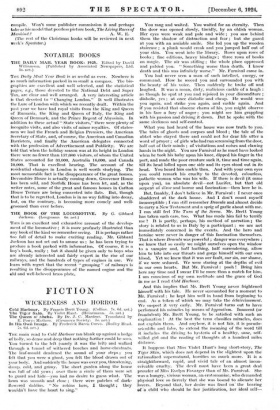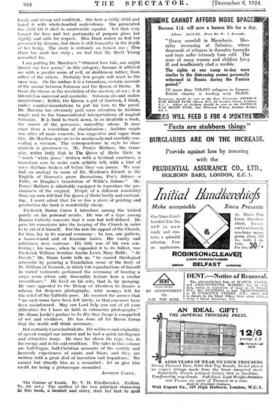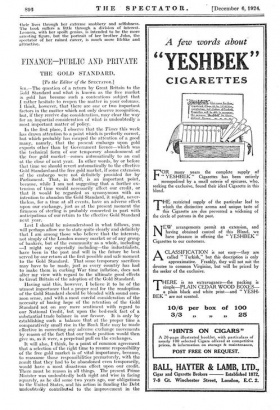FICTION
WICKEDNESS AND HORROR
THE main road to Cold Harbour ran blank up against a hedge of holly, so dense and deep that nothing further could be seen. You turned to the left (surely it was the left) and walked through a tunnel of withered beeches and horse-chestnuts. The leaf-mould deadened the sound of your steps ; you felt that you were a ghost, you felt the blood drawn out of your body. And suddenly the house was over you, threatening, damp, cold, and grimy. The short garden along the house was full of old yews ; over there a circle of them were set to guard and hide—you had no desire to guess what. The lawn was smooth and close ; there were patches of dark- flowered dahlias. " No robins here, I thought ; they wouldn't have the heart to sing."
You rang and waited. You waited for an eternity. Then the door was opened slowly, timidly, by an oldish woman.
Her eyes were weak and pale and wide ; you saw behind them the shadow of distraction and fear ; but she gazed at you with an amiable smile. She led you up the wooden staircase ; a plank would creak and you jumped half out of your skin. You went into the library. Rows upon rows of books ; fine editions, heavy bindings ; three rows of books on magic. The air was stifling ; the whole place oppressed and palsied you. " Something worse than death. I know death and this was infinitely worse." Mr. Furnival came in. You had never seen a man of such intellect, energy, or command. How he wooed you and surrounded you with the beauty of his voice. Then suddenly he broke off and laughed. It was a mean, dirty, malicious cackle of a laugh : as though he spat at you and rejoiced in your diScomfiture ; diabolic, yes ; at once diabolic and cheap. He would woo you again, and strike you again, and cackle again. And if you resisted that obscene charm of his, you might observe in his face a fury of anger ; you might see him grappling with his passion and driving it down. But he spoke with the same sleekness and self-control.
What you had heard of the house was now truth to you. The tales of ghosts and corpses and blood ; the tale of the abbot who stayed there and could not for dear life utter a word of prayer ; of girls who had run screaming from the door, half out of their minds ; of visitations and noises and clawing hands in the night. You saw Furnival as he must have looked when he took his baby upon his knee, dipped his finger in the port, and made the poor creature suck it, time and time again, till its head lolled upon one side and its eyes stood out in its head. You heard him cackle then. And with your own eyes you could remark his cruelty to the devoted, colourless, pathetic woman who was his wife. If there is devil (it came upon you), an absolute devil—not Lucifer, but that old serpent of slime and horror and fascination—then here he is.
But, frankly, I don't believe in Mr. Furnival : I never once shuddered at the dark house. And I don't count myself insusceptible ; I can still remember Dracula and almost decide to carry a New Testament and a sprig of garlic about with me. I can still feel The Turn of the Screw. Mr. Brett Young has taken such care, too. What has made him fail to terrify me ? It is partly, perhaps, his method of narration ; the story is related to us in Italy by a participant ; we are not immediately . concerned in the events. And the hero and heroine were never in danger of this fascination themselves. That is where Dracula was powerful ; danger was everywhere ; we knew that so easily we might ourselves open the window to a vampire and, half loathing, half surrendering, allow him to bite into our throats and gorge himself with our own blood. Yet we knew that it was our fault, our sin, our shame, if we were seduced. We were staring at the depths of evil in our own hearts. But Mr. Furnival : pooh ! Bring him here any time and I swear be more than a match for him. I am conscious of my own rectitude and the grace of God in me as I read Cold Harbour.
And this implies that Mr. Brett Young never frightened himself with his tale. He never succumbed for a moment to Mr. Furnival ; he kept him well in hand from beginning to end. As a token of which we may take the eclaircissement. We suspect it very early. Mr. Furnival turns out to have performed his miracles by means of hypnotism. Innocent (or fraudulent) Mr. Brett Young, to be satisfied with such an explanation ! At the best the term classifies miracles, does not explain them. And anyhow, it is not fair, it is pseudo- scientific and false, to extend the meaning of the word till it includes the driving to hysteria of a healthy, sane, self- willed girl and the reading of thoughts at a hundred miles distance.
It happens that Miss Violet Hunt's long short-story, The Tiger Skin, which does not depend in the slightest upon the rationalized supernatural, horrifies us much more. It is a straightforward, rapid, and vivid tale of an almost incon- ceivable cruelty. The devil must have been a great deal prouder of Miss Evelyn Favarger than of Mr. Fumival. She was a hungry, vicious woman, an erotomaniac, who demanded physical love so fiercely that she was bound to alienate her lovers. Beyond that; her desire was fixed On' the bearing of "a child who should be her justification, her ideal self- lovely and strong and confident. She bore a sickly child and hated it with whole-hearted malevolence. She persecuted the child till it died in unutterable squalor. Yet that very hunger for love and her pertinacity of purpose gives her dignity and calls for respect. Miss Hunt makes us feel her possessed by demons, but there is still humanity in the depth of her being. The story is certainly an honest one ; Miss Hunt has made her story ; we feel that Mr. Brett Young assembled his.
I am putting Dr. Mardrus's " Oriental love tale, one might almost say love poem," in this category, because it afflicted me with a greater sense of evil, or shabbiness rather, than either of the others. Probably few people will react in the same way. On the surface it is a tremulous, ecstatic account of the amour between Solomon and the Queen of Sheba. It treats the theme as the revelation of the mystery of sex ; it is 'intended as universal and symbolic. Solomon sits and makes incantations ; Balkis, the Queen, a girl of fourteen, I think, makes counter-incantations to put his love to the proof.
Dr. Alardrus has obviously paid some attention to Arabian magic and to the transcendental interpretations of magical formulae. It is hard to track down, in so idealistic a book, the source of the pervasive, unhealthy odour. It may come from a conviction of charlatanism ; Arabian magic was after all more concrete, less suggestive and vague than this. Dr. Mardrus appears to be assiduously and carefully con- cealing a vacuum. The correspondence in style to char- atanism is preciousness. Mr. Powys Mathers, the trans-
ator, writes truly that in The Queen of Sheba there is much ' white prose ' written with a hesitant exactness, a tremulous care to make each syllable tell, with a hint of
verse rhythms broken off before they can annoy. We may find an analogy to some of Dr. Mardrus's French in the English of Dowson's prose Decorations, Poe's Silence--a Fable, or Douglas's translation of Wilde's Salome." Mr.
Powys Mathers is admirably equipped to reproduce the pre- ciousness of the original. People of a different sensibility from my own will-find The Queen of Sheba lovely and enchant- ing. I must admit that for so fine a piece of printing and production the book is wonderfully cheap.
Frederick Baron .Corvo I introduce among the wicked purely on . his personal merits. He was of a type among Roman Catholic converts that is rare but well defined. He gave his conscience into the keeping of the Church in order to be rid of it himself. For the rest the appeal of the Church, for him, lay in Its sensual ceremony : he was, one gathers,
a horno-sexual and of feminine tastes. His vanity and selfishness were extreme. His title was of his own con-
ferring : his name, when he expanded it to its fullest, was Frederick William Serafmo Austin Lewis Mary Rolfe. " At Oscott," Mr. Shane Leslie tells us, " he caused theological admiratio by painting a Translation scene of the body of St. William of. Norwich, in which 149 reproductions of himself in varied vestments performed the ceremony of bearing a corm santo whose only discernible feature bore a similar resemblance." He lived on his wits, that is, by sponging. He once appealed to the Bishop of Aberdeen to finance a scheme for deep-sea photography, with moneys left for the relief of the Catholic poor. He received the answer that " no such sums have been left lately, so that you must have
been misinformed. May our Lord help you out of all your difficulties for I have no faith in submarine photography." Mr. Shane Leslie's preface to In His Own Image is compacted of wit and vividness. He has done all for Baron Corvo that the -world swill think necessary.
But certainly Corvo had talents. His wildness and originality of speech compel our interest and he had a quick intelligence and attractive irony. He rises far above his type, too, in
his energy and in his odd erudition. The tales in this volume are half-Pagan, half-Christian accounts of the earthly and -heavenly experiences of saints and friars, and they are written with a great deal of invention and impudence. We
cannot but Classify him as a scoundrel ; let us give him credit for being a picturesque scoundrel.
ANDREW CAREY.
The Colour of Youth. By V. H. Friedlaender. (Collins. ?Vs. 6d. net.) The mother of the two principal characters dn this book, a 'brother and sister, does her best to spoil their lives through her extreme snobbery and selfishness. The book suffers a. little through a division of interest. Leonora, with her spoilt genius, is intended to be the more arresting figure, but the portrait of her brother John, the spectator of her ruined career, is much more lifelike and attractive.




















































 Previous page
Previous page